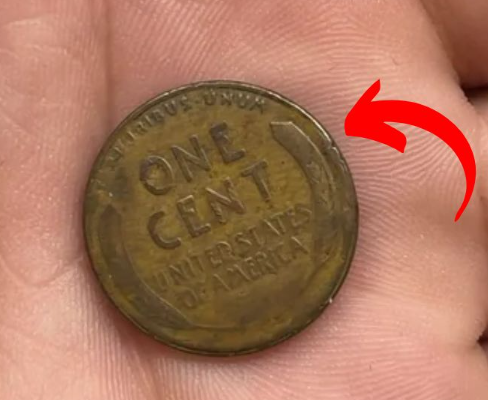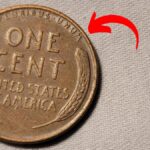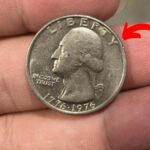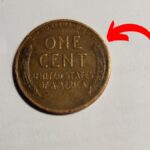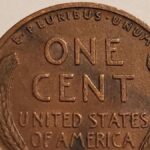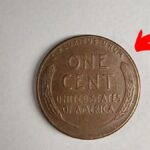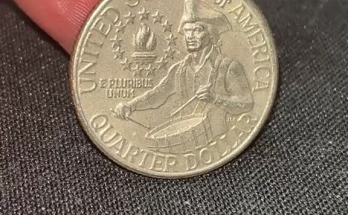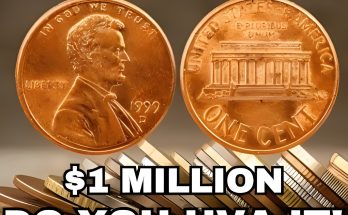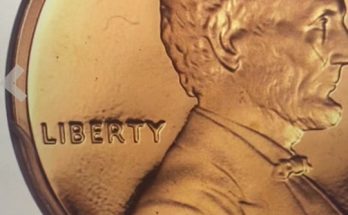In this article, we will explore six of the rarest and most valuable Wheat pennies ever minted. These coins have fetched jaw-dropping sums at auctions and continue to captivate collectors worldwide.
1. The Story of the 1943-D Bronze Wheat Penny
During World War II, copper was in high demand for the war effort, prompting the U.S. Mint to switch from copper to zinc-coated steel for penny production in 1943. However, a few leftover bronze planchets from the previous year were mistakenly used at the Denver Mint, resulting in the ultra-rare 1943-D Bronze Wheat Penny.
This coin is not only rare but also the most valuable Wheat penny ever discovered. With only one confirmed specimen, it holds the record for the highest auction price of any Wheat penny, selling for an astonishing $840,000 in 2010. Its rarity and fascinating origin make it a crown jewel in the world of numismatics.
2. The Mysterious 1944-S Steel Wheat Penny
In 1944, the Mint reverted to using copper for pennies, but a few steel planchets from 1943 accidentally made their way into circulation. Among these rare coins is the 1944-S Steel Wheat Penny, minted in San Francisco.
This penny is incredibly scarce, with only two known examples. One of these coins sold for $373,750 in 2008, making it a prized possession for any collector. Its unique composition and limited availability make it one of the most sought-after coins in U.S. history.
3. The Iconic 1955 Doubled Die Obverse Wheat Penny
The 1955 Doubled Die Obverse Wheat Penny is perhaps the most famous error coin among collectors. This coin features dramatic doubling on the obverse, particularly on the date and the word “LIBERTY,” which is easily visible to the naked eye.
Approximately 24,000 of these error coins were released into circulation, creating a frenzy among collectors and the public. High-grade examples are extremely valuable, with one recently selling for $114,000. The 1955 Doubled Die Penny remains a favorite among enthusiasts for its striking appearance and historical significance.
4. The Coveted 1909-S VDB Lincoln Cent
The 1909-S VDB Lincoln Cent holds a special place in the history of U.S. coinage. It was the first year of the Lincoln penny, and the designer, Victor David Brenner, included his initials “VDB” prominently on the reverse. This sparked public backlash, leading the Mint to remove the initials after a limited production run.
Only 484,000 of these coins were minted at the San Francisco Mint, making them extremely rare. Well-preserved examples are highly coveted, with one selling for $168,000. The 1909-S VDB Lincoln Cent is a must-have for serious collectors due to its historical importance and rarity.
5. The Unique 1922 No D Strong Reverse Wheat Penny
In 1922, all pennies were produced at the Denver Mint and were meant to carry the “D” mint mark. However, due to a filled die error, some coins were struck without the “D.” Among these, the most desirable version is the 1922 No D Strong Reverse Wheat Penny, which features sharp details on the reverse.
This error coin is a favorite among collectors for its intriguing story and scarcity. At auction, one of these pennies fetched $82,250, a significant amount for an error coin. Its rarity and the mystery surrounding its creation make it a valuable addition to any collection.
6. The Rare 1917 Doubled Die Obverse Wheat Penny
Another exceptional error coin is the 1917 Doubled Die Obverse Wheat Penny. This coin features noticeable doubling on the date and the motto “IN GOD WE TRUST,” resulting from a misaligned die during the minting process.
With only about 200 examples known to exist, uncirculated specimens are incredibly rare and valuable. One high-grade coin sold for $120,000, making it a prized possession for numismatists. The 1917 Doubled Die Penny is a testament to the enduring allure of error coins among collectors.
Why Are Rare Pennies So Valuable?
Rare Wheat pennies are highly sought after for several reasons:
- Limited Supply: Coins with minting errors or small production runs are inherently scarce, driving up their value.
- Unique Features: Minting mistakes and historical oddities make these coins stand out from regular issues.
- Condition: Coins in excellent condition are more likely to command top dollar at auctions.
- Collector Demand: The passionate coin-collecting community continually seeks rare pieces, creating strong demand.
How to Spot a Rare Penny
If you’re interested in identifying valuable coins, here are some tips:
- Check the Date and Mint Mark: Look for key years like 1943, 1944, 1955, 1909, 1922, and 1917.
- Inspect for Errors: Doubling, missing mint marks, or unusual materials are telltale signs of a rare coin.
- Use a Magnifier: Small details, like designer initials or doubling, are easier to spot with magnification.
- Get Expert Advice: Consult a numismatist or have your coin graded by a professional service for an accurate assessment.
Final Thoughts
Wheat pennies are more than just coins; they are pieces of history that tell fascinating stories. While most Wheat pennies are common and affordable, the rare examples highlighted in this article can fetch incredible sums at auction. Whether you’re a seasoned collector or a curious beginner, these coins offer a glimpse into the artistry and craftsmanship of U.S. minting.
By learning to identify rare pennies and understanding their historical significance, you can embark on an exciting journey into the world of numismatics. Who knows? You might even discover a hidden treasure in your pocket change!
